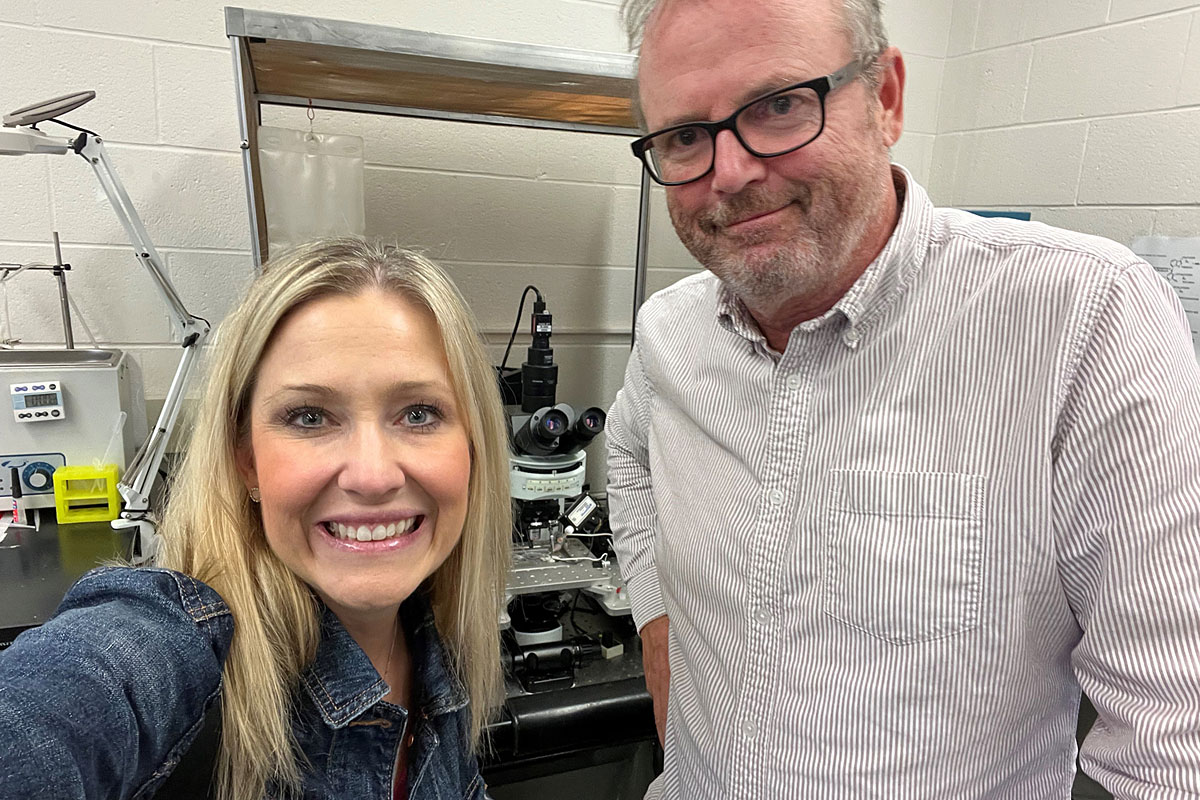Amber Freed and her son, Maxwell. (Courtesy of Amber Freed)
By Erika Fredrickson, UM Information Service
MISSOULA – Amber Freed was like every mom on the lookout for solutions. Her twins – born in 2017 – have been nonetheless infants when she and her husband observed Maxwell wasn’t advancing on the identical tempo as his sister, Riley. The docs tried to reassure the household, however Freed knew there was one thing unsuitable. Quickly the docs did, too.
“I observed the physician’s tone change from, ‘You’re only a loopy new mother,’ to considered one of panic,” Freed mentioned.
After some medical exams, the Freeds realized Maxwell has a genetic mutation that causes a spectrum of neurodevelopment issues that may embrace epilepsy, developmental delays, motion issues and options of autism. This genetic mutation was so uncommon it is just often known as SLC6A1, named after the affected gene location.
Whereas SLC6A1 is now listed among the many top-10 gene variants related to autism or epilepsy, on the time there have been solely 30 children on the planet with the SLC6A1 prognosis. The docs instructed the Freeds to look at and wait. Social companies instructed them, “Go house and provides him one of the best life you’ll be able to.”
However Amber Freed was fiercely decided to discover a remedy. The day Maxwell was recognized, she left her profession in fairness evaluation and acquired books on molecular biology, genetics and neuroscience. She reached out to scientists engaged on related genetic mutations. She tracked down different households impacted by the SLC6A1 prognosis. She contacted politicians. She understood that as a mom with a enterprise diploma and the flexibility to give up her job, she was within the distinctive place to advocate – not only for Maxwell, however for different children, too.
“I used to be going to combat like a mom for my son,” she mentioned. “I used to be going to do the whole lot in my energy to offer him a shot on the life he was meant for and never let this illness have an effect on him. So I devoted my life to forming a therapy for him and each different baby with it.”
Freed, initially from Billings, quickly realized that analysis funding for Maxwell’s illness is extraordinarily restricted. In 2018 she based SLC6A1 Join, a patient-led group making main strides in analysis in regards to the dysfunction. The group advocates for households, supplies schooling and sources, hosts conferences and serves as a neighborhood hub. Freed and her group have raised hundreds of thousands of {dollars} to help analysis throughout the nation, turning curious docs into SLC6A1 specialists alongside the way in which.
Amber Freed visits neuroscience Professor Mike Kavanaugh on the College of Montana. (Courtesy of Amber Freed)
Freed’s tenacity additionally led her to hunt out Dr. Mike Kavanaugh, a professor of neuroscience within the Division of Organic Sciences on the College of Montana. Kavanaugh has studied the features of the SLC6 gene household within the mind for greater than twenty years. He has labored with drug firms and organizations, together with the n-Lorem Basis, a nonprofit devoted to treating sufferers like Maxwell by growing new RNA-targeting therapies for genetic ailments.
Kavanaugh and his college students at UM performed experiments that outlined the impact of Maxwell’s mutation and established that he was an excellent candidate for a kind of gene remedy often known as antisense oligonucleotide (ASO) remedy. Their work led to the event of promising new ASO therapies for Maxwell that at the moment are present process additional testing.
In the meantime, ongoing analysis continues with the UM group’s discovery of an alternate class of medication they hope will result in extra broadly accessible therapy for the increasing group of youngsters recognized with SLC6A1 mutations.
Personal help for UM’s neuroscience program is important to advancing Kavanaugh’s cutting-edge analysis. Gene remedy and drug growth analysis prices hundreds of thousands of {dollars} for primary growth and scientific trials, all of which takes years. The price is also excessive for sufferers and is normally not coated by insurance coverage. Total prices are anticipated to lower as scientific discoveries progress.
SLC6A1 Join has turn into a key philanthropic companion for UM’s neuroscience program by vital monetary and analysis contributions. Continued help from the group will scale up Kavanaugh’s vital efforts, entice expertise to find progressive options and supply thrilling alternatives for college students in quite a lot of majors throughout the organic sciences, whereas positioning UM as a number one establishment in genetic remedy.
“Amber Freed is a pressure of nature,” Kavanaugh mentioned. “Her contributions to discovering a remedy for her son and different households affected by SLC6A1 are inspiring.”
Philanthropy ensures Kavanaugh and different neuroscience researchers at UM can proceed to contribute to the event of groundbreaking remedies for a variety of genetic diseases related to neurological situations. With ongoing non-public help, this work will profit extra individuals world wide who’re impacted by many genetic ailments just like SLC6A1, together with epilepsy, autism, Parkinson’s illness, Alzheimer’s illness and extra.
Final yr, SLC6A1 Join acknowledged Kavanaugh’s efforts with the Scientific Hero of the Yr Award.
“All SLC households worship the bottom Dr. Kavanaugh walks on for his dedication to serving to our youngsters,” Freed mentioned. “In our darkest second, we took refuge in figuring out how a lot he personally cares and the way a lot that equates to skilled enthusiasm. And now he’s placing Montana on the map as a hub in precision drugs for neurology.”
To help the Kavanaugh lab and the neuroscience program, e-mail Dan Minor, senior director of growth at UM Faculty of Humanities and Sciences, at [email protected] or name 406-243-2646.
###
Contact: Elizabeth Willy, director of communications, UM Basis, 406-243-5320, [email protected].
